Table of Contents
The UGC NET Folk Literature Syllabus for 2025 is now accessible in the official notification. Candidates gearing up for the NET Exam in Folk Literature should review the comprehensive syllabus and exam pattern outlined below. For those interested in preparing for the NTA NET Exam in Folk Literature (Subject Code 71), detailed information is available in the following article.
UGC NET Folk Literature Exam Pattern
The UGC NET Folk Literature examination pattern is structured around two papers: Paper I and Paper II. Paper I is standardized across all subjects and evaluates candidates on their teaching and research aptitude, reasoning ability, comprehension, divergent thinking, and general awareness. It comprises 50 multiple-choice questions, each worth two marks. Paper II, on the other hand, specifically focuses on Folk Literature and includes 100 multiple-choice questions based on the syllabus outlined by UGC.
The UGC NET paper evaluates candidates’ comprehension of literary theories, comparative methodologies, major literary movements, and works from various cultures and languages. Both papers are administered online, and candidates must achieve the minimum qualifying marks in each paper as per UGC guidelines to be eligible for consideration for Assistant Professorship or Junior Research Fellowship.
UGC NET Syllabus For Folk Literature Paper II
This syllabus provides a comprehensive framework for candidates preparing for the UGC NET Folk Literature Paper II exam, covering key theoretical perspectives, methodological approaches, and thematic areas essential for advanced study and research in comparative literary studies.
The UGC NET Exam pattern for Folk Literature Paper II is as follows:
- Mode of Exam: Computer Based Test (CBT)
- Language: English or Hindi (as chosen by the candidate during application)
- Number of Questions: 100 questions
- Marks per Question: 2 marks each
- Total Marks: 200 marks
- Duration: 2 hours
- Negative Marking: There is No negative marking for incorrect answers.
UGC NET Folk Literature Important Topics
UGC NET Folk Literature Important Topics have been provided below for the NET exam better preparation.
- Concepts of Folklife and Folkloristics
- Folklore as Data and Folklore as Study
- Definition and Epistemology of Folk Literature
- Solar Mythology or Comparative Philology
- Concepts of Ferdinand de Saussure and Theory of Vladimir Propp
- Culture as Performance
- Folklore and Communication
- Ideologues of Globalisation
- Musical Traditions and Life Style Patterns
- Categorization of Fieldwork Operations
UGC NET Folk Literature Syllabus Unit-wise
The detailed unit wise UGC NET Folk Literature Syllabus PDF has been provided below.
Unit–1: Folklore- Definition, Concept and Classification
- Who are the Folk?
- Concepts of Folklife and Folkloristics
- Ethnicity
- Family types- Natal, Conjugal, Nuclear, Extended (Generational and Polyandrous)
- Types of relationships in Family- direct, shared, sexual, descent
- Functions of Family
- Kinship Terminology- Types of Kinship, Role of Kinship
- Social Categories and Social Organization in the creation, transmission and sustenance of Folklore / Folklife.
- Conceptual shift from ‘Popular Antiquities’ to ‘Folklore’
- Genres and Functions of Folklore- Ethnic Genres and Analytical Categories
- Classification of Folklore- Verbal, Nonverbal, Intermediary Genres
- Genre Theory- Alan Dundes, Richard Dorson
- Ben Amos, Richard Bauman, Roger Abrahams
- Functions of Folklore- William Bascom, Louri Honko
- Characteristics of folklore.
Unit–2: Historiography of Folkloristics
- Folk, from ‘Savage’ to ‘Imagined Group’
- Folklore as Data and Folklore as Study
- Oracy Vs. Literacy
- Classical Vs. Folk
- Emergence of Folklore as an Academic Discipline
- Folklore Studies in Abroad
- Folklore Studies in India
- Subaltern Studies
- Tribal Studies
- Diaspora Studies
- Green Studies
Unit–3: Folk Literature
- Definition and Epistemology of Folk Literature
- Fields of Folk Literature: Myths, Epics, Legends, Folk Tales, Folk Songs, Proverbs, Riddles, Tongue Twisters, Speech Acts
- Verbal Art in Performances: Theatre, Dance Drama, Medicinal Chants, Verbose in Play Genres etc.
- Literary Devices
- Ethnic Slurs
- Rumor
- Personal Narratives
- Oral History
Unit- 4: Theories of Folklore – I: Diachronic Approaches
- Evolutionary Theories
- Concept of Evolution
- Unilinear and Multilinear Approaches
- E.B. Tylor, George Mudrock, Lewis Morgan, James Frazer
- Myth-Ritual Theory
- Solar Mythology or Comparative Philology
- Devolutionary Theories
- Concept of Devolution
- Types of Devolutionary Theories- Marxists and Elitists
- Diffusion Theories (Monogenesis)
- Concept of Diffusion
- Indianist Theory or Benfy’s Migration Theory
- Egyptians School and Finnish School or Historical-Geographic Method
- Diffusion Theories (Polygenesis)
- Psychic Unity
- Convergence Vs. Parallelism Theories
- Romantic Nationalism and its Manifestations
Unit- 5: Theories of Folklore – II: Synchronic Approaches
- Structural Approaches
- Basic concepts
- Syntagmatic Structuralism
- Concepts of Ferdinand de Saussure and Theory of Vladimir Propp
- Application of Proppian Model to Folklore
- Paradigmatic Structuralism
- Concepts of Roman Jacobson and Theory of Claude Levi-Strauss
- Application of Straussian Model to Folklore
- Functional Approaches
- Basic Concepts
- Social Functionalists: Bronislaw Malinowski, Radcliffe-Brown, Emile Durkheim
- Symbolic Functionalists: Clifford Geertz, Victor Turner
- Psychological Approaches
- Psychoanalysis- Basic Concepts of Sigmund Freud, Freud’s Theoretical applications to Folklore
- Analytical Psychology- Basic Concepts of Carl J. Jung, Jung’s Theoretical Applications to Folklore
- Jacques Lacan’s Theory
- Contextual Approaches
- Basic Concepts
- Verbal Art as Performance
- Linguistic and Communicative Models of Roman Jacobson
- Oral Formulaic Theory or Parry-Lord Theory
- Lauri Honko’s concept of ‘Multiforms’
- Poststructural and Postmodern Approaches
- Meaning and Tenets of Poststructuralism, New Hermeneutics, Text, Textuality, Textual Analysis
- Paul Ricoeur and Theories of Interpretation
- Historical Milieu of the Theories
- Concept and Theory of Deconstruction Derrida, Lacan, Foucault
- Gender Theories and Approaches
- Gender and Genre
- Feminism and Gender Perspectives
- Queer Theory
- Semiotic Approaches
- Semiotic Approach to Folk Culture Studies
- Ferdinand de Saussure and Charles S. Pierce on Sign System and Culture
- Perspectives on Discourse Analysis
Unit- 6: Folklife and Cultural Performances
- Culture as Performance- Erving Goffman, Clifford Geertz, Milton Singer
- Rites of Passage and Territorial Rites – Arnold van Gennep, Victor Turner
- Performance Centered Approach- Roger D. Abrahams, Richard Bauman, Richard Schechner
- Dell Hymes’s Ethnography of Speaking Approach
- Analysis of Folk Narratives
Unit-7: Public Folklore and Mass Media
- Basic Concepts- Folklore, Folklorism, Folklorismus, Folklorization, Applied Folklore, Public Folklore and Second Life of Folklore
- Folklore in Public Sphere
- Folklore and Communication
- Folklore and New Media
Unit- 8: Folklore and Globalisation
- Theories of Global Culture
- Discourse on Modernity, Post-Modernity and Globalisation
- Ideologues of Globalisation- Emergence of Populism
- Influence of Globalisation in Socio-cultural Life
- Issues and Concepts of Identity
- Glocal vs. Global, Homogeneity Vs. Heterogeneity and Hybridization
- Changing Dimensions and domains of Folklore Genres and Folk Performances
- Cultural Tourism
- Neo-Folk Formations and Protest Movements
- Challenges to Native Cultures
- Bio-politics
Unit-9: Indian Folk Cultural Practices
- Genres of Folk Theatre
- Narrative Enactments
- Puppet Theatre
- Dance Dramas
- Musical Traditions and Life Style Patterns
- Naming System and Onomastics
- Occupational Folklore
- Family Folklore
- Folk Religious Practices
- Pilgrimage and Ritual Practices
- Fairs and Festivals
- Folk Medicinal Practices
- Folk Art and Craft
- Folk Architecture
- Folk Foodways and Culinary Practices
- Folk Games
- Dress and Clothing
- Manners and Customs
- Customary Law and Jurisprudence
- Worldview
- Regional Variations and Versions
Unit-10: Fieldwork, Documentation and Archival Practices
- Categorization of Fieldwork Operations:
- Pre-fieldwork
- Fieldwork
- Post-fieldwork
- Notions of ‘field’ and ‘data’
- Thick and Thin Data
- Methods and Techniques
- Survey Method
- Observation Method
- Ethnographic Method
- Postmodern Ethnographic Method
- Dialogical and Discourse Methods
- Focus Group Method
- Documentation and Archival Practices
- Preservation and Conservation of Tangible and Intangible Cultures
- Fieldwork Ethics and Copyright Issues
- Patent Rights
UGC NET Folk Literature Syllabus PDF Link
The direct Link has been available to download the UGC NET Folk Literature Syllabus PDF provided below. Click on below link to download the UGC NET Syllabus for Folk Literature Subject.
UGC NET Folk Literature Syllabus PDF Link
UGC NET Folk Literature Paper II Marking Scheme
The UGC NET Folk Literature Paper II follows a straightforward marking scheme:
- Each question carries 2 marks. This applies to all 100 questions in the paper.
- There is no negative marking. You won’t be penalized for attempting a question and getting it wrong. There’s no deduction of marks for incorrect answers.
- Marks are awarded only for correct responses. Make sure you choose the most accurate answer for each question to score.
- Unanswered questions receive 0 marks. It’s generally advisable to attempt all questions, even if you’re unsure.

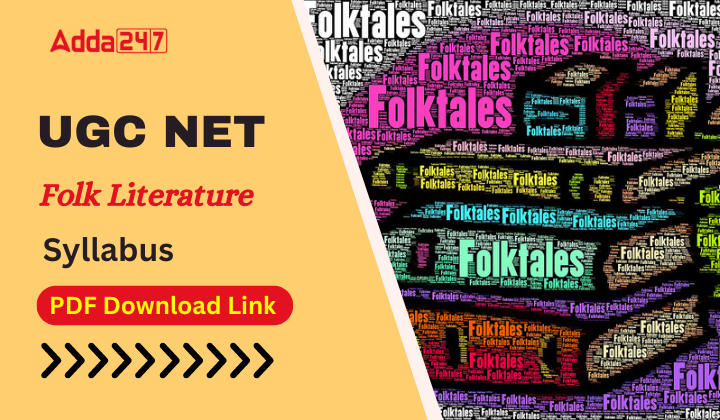
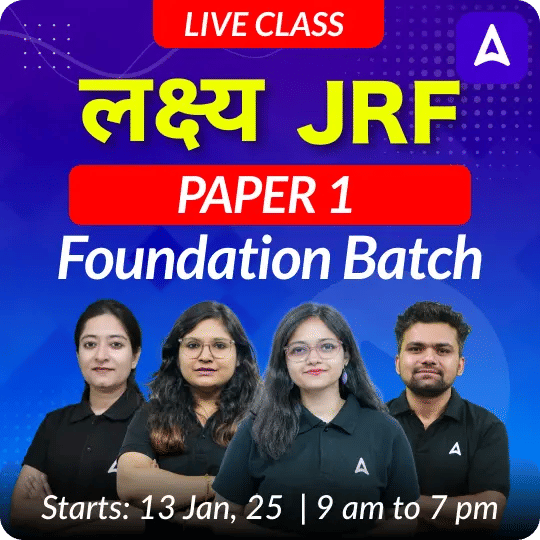

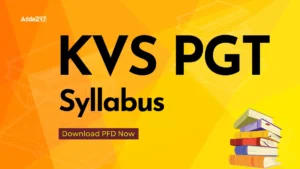 KVS PGT Syllabus 2025, Download PGT Syll...
KVS PGT Syllabus 2025, Download PGT Syll...
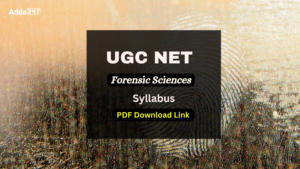 UGC NET Forensic Science Syllabus 2025 a...
UGC NET Forensic Science Syllabus 2025 a...
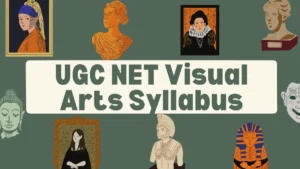 UGC NET Visual Arts Syllabus 2025 PDF Do...
UGC NET Visual Arts Syllabus 2025 PDF Do...














